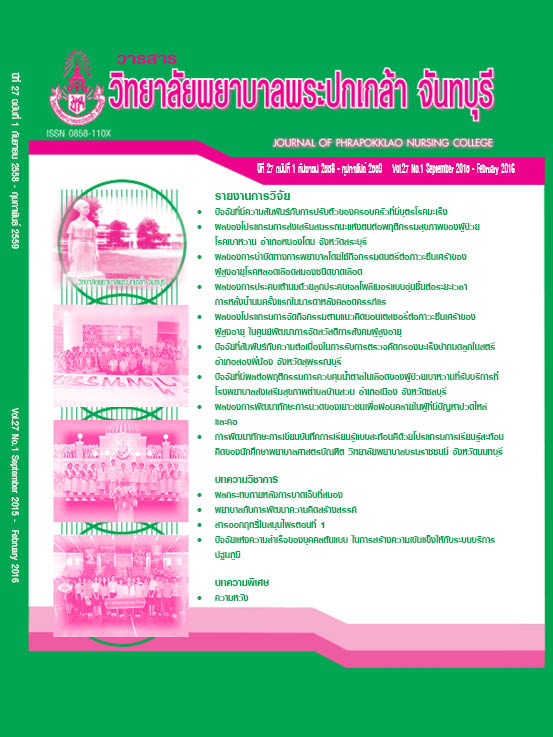Factors Correlated with Family Adaptation in Families Having Children with Cancer
Keywords:
Family adaptation, Factors correlated with family adaptation, Children with cancerAbstract
This descriptive correlational study aimed to examine the relationship between factors correlated with family adaptation in families having children with cancer by using The Resiliency Model of Family Stress, Adjustment and Adaptation (McCubbin & McCubbin, 1993). The samples included 225 mothers of children with cancer who met the criteria completed a set of questionnaires, including the Lansky score, health and demographic form; Therapy-Relate Symptom Checklist for Children with the reliability of .89; Impact on Family Scales with the reliability of .80; Family Inventory of Resources and Management with the reliability of .80; Social Support Index with the reliability of .80; Family Crisis Oriented Personal Scales with the reliability of .88; and Family Adaptation Scales with the reliability of .96. Data were collected from January to February, 2014. Statistics applied for data analysis consisted of frequency, percentage, mean, standard deviation, and Pearson’s product moment correlation coefficient.
The study found that there were positive relationships between family adaptation in families having children with cancer and these following factors; family resources (r = .427, p < .001), social support (r = .376, p < .001), and family problem solving and coping skills (r = .420, p < .001). In addition, there was a negative relationship between family adaptation in families having children with cancer and cancer illness severity (r = -.230, p < .01). However, there was no relationship between family appraisal of illness and family adaptation in families having children with cancer.
This study suggested that nurses and family caretakers of children with cancer should be emphasized to family resources, social support, and family problem solving and coping skills, and cancer illness severity.
References
American Cancer Society. (2012). Childhood cancer: Cancer facts and figures. Retrieved March 12, 2013, form http://www.cancer.org/cancer/cancerinchildren
Branstetter, J. E. (2007). Pediatric chronic illness or disability: Family caregivers’ report of well child-sibling caregiving (doctoral dissertation). Lawrence: University of Kansas.
Grant, G., & Whittell, B. (2000). Differentiated coping strategies in families with children or adults with intellectual disabilities: The relevance of gender, family composition, and the life span. Journal of Applied Research in Intellectual Disabilities, 13(4), 256-275.
Hoekstra-Weebers, J. E., Jaspers, J. P., Kamps, W. A., & Klip, E. C. (2001). Psychological adaptation and social support of parents of pediatric cancer patients: A prospective longitudinal study. Journal of Pediatric Psychology, 26(4), 225-235.
McCubbin, M. A., & McCubbin, H. I. (1993). Family coping with illness: The resiliency model of family stress, adjustment and adaptation. In Danielson, C. B., Hamel-Bissell, B., & Winstead-Fry, P. (Eds.). Families, health & illness: Perspectives on coping and intervention. pp. 21-63. St. Louis: Mosby.
Ness, K. K., et al. (2005). Limitations on physical performance and daily activities among long-term survivors of childhood cancer. Annals of Internal Medicine, 143(9), 639-647.
Phuphaibul, R., Churaitassanee, S., Thachathong, A., Kongsaktrakul, C., Punthangkura, W., & Martinson, I. M. (2000). The impacts of childhood cancer on families, research report. Bangkok: Faculty of Medicine, Ramathibodi Hospital, Mahidol University.
Puasiri, S. (2010). Factors predicting adaptation of Thai families with mentally ill adolescents (doctoral dissertation). Bangkok: Mahidol University.
Schumacker, R. E., & Lomax, R. G. (2010). A beginner’s guide to structural equation modeling (3rd ed.). New York: Routledge.
Shanberg, R., Williams, P. D., & Piamjariyakul, U. (2011). Complementary therapy/ care to relive pediatric cancer therapy related symptoms in Thailand. The Journal of BSN Hornors Research, 4(1), 95-110.
Van Riper, M. (2007). Families of children with Down syndrome: Responding to “a change in plans” with resilience. Journal of Pediatric Nursing, 22(2), 116-128.
Wiangnon, S., & Kamsa-Ard, S. (2003). Childhood cancer. In Sriplung, H., et al. (Eds.). Cancer in Thailand 1995-1997 Volume III. pp. 71-78. Bangkok: Bangkok Medical Publisher.
Williams, P. D., et.al. (2012). A symptom checklist for children with cancer: The Therapy-Related Symptom Checklist-Children. Cancer Nursing, 35(2), 89-98.
Williams, P. D., Lorenzo, F. D., & Borja, M. (1993). Pediatric chronic illness: Effects on sibling and mothers. The American Journal of Maternal/Child Nursing, 21(4), 111-121.
Young, B., Dixon-Woods, M., Findlay, M., & Heney, D. (2002). Parenting in a crisis: Conceptualizing mothers of children with cancer. Social Science & Medicine, 55(10), 1835-1847.
Downloads
Published
How to Cite
Issue
Section
License
Copyright (c) 2016 Journal of Phrapokklao Nursing College

This work is licensed under a Creative Commons Attribution-NonCommercial-NoDerivatives 4.0 International License.
เนื้อความ ข้อมูล และรายการอ้างอิงที่ผู้เขียนใช้ในการเขียนบทความเพื่อลงตีพิมพ์ในวารสารวิทยาลัยพยาบาลพระปกเกล้า จันทบุรี ถือเป็นความคิดเห็นและความรับผิดชอบของผู้เขียน คณะผู้จัดทำวารสารไม่จำเป็นต้องเห็นพ้องด้วยหรือร่วมรับผิดชอบ
บทความที่ได้รับการลงตีพิมพ์ในวารสารวิทยาลัยพยาบาลพระปกเกล้า จันทบุรี ถือเป็นลิขสิทธิ์ของวารสารวิทยาลัยพยาบาลพระปกเกล้า จันทบุรี หากหน่วยงานหรือบุคคลใดต้องการนำส่วนหนึ่งหรือทั้งหมดของบทความไปเผยแพร่ต่อเพื่อวัตถุประสงค์ใด ๆ จะต้องได้รับอนุญาตจากบรรณาธิการวารสารก่อน



